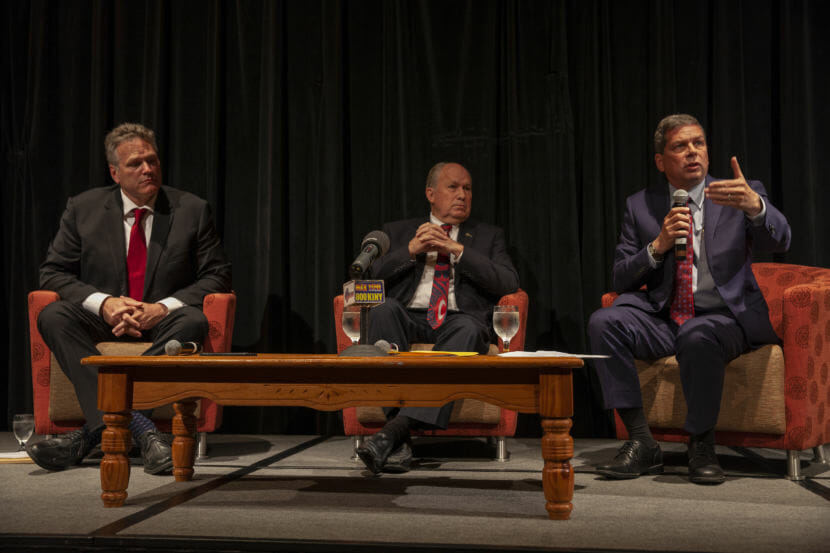Gavel Alaska coverage of forum (also available as a Facebook video)
The three major candidates vying to become Alaska’s next governor debated permanent fund dividends and other issues in Juneau Thursday.
How to pay for state government – as well as for permanent fund dividends – was a point of big division for the candidates at the Juneau Chamber of Commerce forum. Gov. Bill Walker, an independent, asked Republican former state Sen. Mike Dunleavy about $1.1 billion in budget cuts he said he would make in January 2017.
Walker noted that Dunleavy declined to say he would cut specific departments during a recent KTVA-hosted debate.
“Nearly every department, you said no,” Walker said. “So, could you tell us today where’s that $1.1 billion cut you’ve been talking about so much? It fits on a bumper sticker, but I’m not sure where it comes from.”
Dunleavy isn’t proposing the same cut this year. He said the state must develop its natural resources more to generate revenue.
Dunleavy asked Walker if he would handle his veto of dividends two years ago differently today.
“Cutting that PFD in half, causing a number of small businesses to fail, as well as individuals having to really take a look at their finances and reconfigure how they were going to manage through that process — knowing this, would you do anything different?” Dunleavy asked.
Walker said he doesn’t look back, but that the veto allowed the permanent fund to grow and keep dividends secure in the future.
Democratic former U.S. Sen. Mark Begich questioned Dunleavy’s plan for paying out PFDs. Dunleavy supports the traditional formula for dividends, which would raise their cost by $840 million this year. Begich said this will lead to unsustainable draws on permanent fund earnings.
“When you lay out your numbers, at some point something’s gonna give,” Begich said. “And what will give is the earnings reserve, and at some point, it will be to zero. Which means, your plan does not have a long term. It’s a short term. I get it, I see what you’re saying, but the long-term plan, for the next generation is: There will be no money to help service not only the government, but also, there will be no dividend.”
Begich’s dividend plan would cost roughly $300 million more than the state will spend on PFDs this year.
Begich said he has a track record at the federal and local level of working with politicians who disagree.
“You know, if you have to work with (U.S. Senators) Bernie Sanders and Ted Cruz and everyone in between, working here in Juneau is not that hard, I’m going to tell you that,” Begich said. “And if you’ve been an assembly member, and you’ve survived that, everything is a piece of cake.”
Walker defended his record, noting that the projected gap between what the state spends and what it raises has fallen from $3.7 billion dollars to $700 million.
“I refer to it as, the fiscal house was on fire. And it was on fire. And Lt. Gov. Mallott and I ran to it,” said Walker, who later added: “Lt. Gov. Mallott and I know that the fire’s put out, because these two folks want to move into the house that now we put the fire out of.”
Dunleavy said he would look to lower the limit on how much the state government can spend.
“We have to revisit that appropriation limit,” Dunleavy said. “We have to look at a way to cap the size and growth of this operating budget. If we don’t do that, there is no fiscal plan, there is no amount of PFD that can keep up with it.”
The candidates addressed some issues of particular interest to Southeast Alaska. They all said the capital will remain in Juneau.
Dunleavy said he supports extending the road north from Juneau. Walker said the proposal is flawed because it wouldn’t connect with other roads, and that addressing the remaining budget shortfall is a bigger priority. Begich said he wouldn’t restart the road project, adding that there should be a statewide approach to building roads and other projects.
The candidates varied widely in their assessments of President Donald Trump. On a scale of 0 to 10, Begich graded him as a “4 minus,” which he revised to a “2” after the debate. Dunleavy gave Trump an “8.” And Walker gave him a “5.”

Andrew Kitchenman is the state government and politics reporter for Alaska Public Media and KTOO in Juneau. Reach him at akitchenman@alaskapublic.org.




